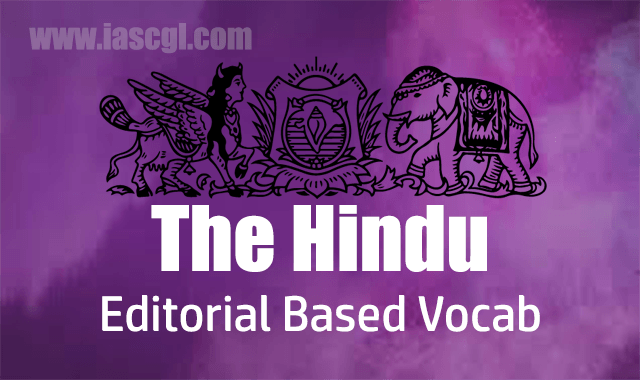The Hindu Vocab 23 Aug 2018, Prepared by Neha Singh.

Hello Aspirants, I received many emails from you/users regarding The Hindu Vocab. Daily Vocab will help you in competitive exam link SSC, Bank and State Level Exams. If you like this please comment your review. This will help her to prepare more and best for you. You can check today's(23 August 2018)'s vocab from The Hindu, below.
Retrograde move
Punjab’s proposal to provide for a life term for sacrilege is excessive and undesirable
The Punjab Cabinet’s decision to amend the law to make acts of sacrilege against the holy books of major religions punishable with life imprisonment is retrograde and fraught with undesirable consequences. It may also set off a needless flurry of legislation in the rest of India to pander to different groups. The current proposal is a slightly expanded form of amendments passed by the Punjab Assembly in 2016, specifically aimed at curbing acts of sacrilege targeting the Guru Granth Sahib. The Centre had then returned the Bills, saying that protecting the holy book of only one religion would make it discriminatory and anti-secular. The proposal now cleared by the Cabinet aims to also cover the Bible, the Koran and the Bhagvad Gita. In specifics, the law will introduce a new section (Section 295-AA) in the Indian Penal Code after India’s own ‘blasphemy law’, Section 295-A, which criminalises “deliberate and malicious acts intended to outrage religious feelings”. As prior permission of the Central or State government is needed to prosecute someone under such sections, a consequential amendment to the Code of Criminal Procedure will be required. The earlier Bill was introduced by the Shiromani Akali Dal government following allegations of desecration of the holy book. Opposition to the Bill was then limited to the question whether holy books of other religions did not warrant the same protection. None seemed concerned about using religious sensitivities to score political points.
Is there any necessity for a fresh provision to protect religious books from damage, insult and sacrilege, when Section 295-A itself covers it? While upholding its constitutional validity in 1957, the Supreme Court had clarified that the section “punishes the aggravated form of insult to religion when it is perpetrated with the deliberate and malicious intention of outraging religious feelings”. It is true that one limb of any blasphemy law, as Section 295-A can be termed, is aimed at preserving public order; and miscreants can fan disorder and tension by malicious acts such as damaging or desecrating a holy text. This can be invoked to jail someone for three years. Providing for a life term for the same offence in relation to religious texts would be grossly disproportionate. ‘Sacrilege’ itself is a vague term, and would render the section too broad. There is a history of misuse of laws aimed to protect religious sentiments, and those that seek to punish persons who promote enmity between different groups. They have a chilling effect on free speech, and give a handle to anyone claiming to be outraged to pursue vexatious prosecutions. There is a case to read down Section 295-A and Section 153-A of the IPC that give scope to prosecute people in the name of protecting the feelings of a section of society. There is no case whatsoever to enhance jail terms.
- Retrograde: पतित - directed or moving backward..
- sacrilege: अपवित्रीकरण - violation or misuse of what is regarded as sacred.
- flurry: घबराहट - a small swirling mass of something, especially snow or leaves, moved by sudden gusts of wind.
- pander: बढ़ावा देना - a pimp.
- escalation: वृद्धि - a rapid increase; a rise.
- perpetrated: बढ़ावा - carry out or commit (a harmful, illegal, or immoral action).
- blasphemy: ईश - निंदा - the act or offense of speaking sacrilegiously about God or sacred things; profane talk.
- miscreants: शरारती तत्वों - a person who behaves badly or in a way that breaks the law.
- vague: अस्पष्ट - of uncertain, indefinite, or unclear character or meaning.
- vexatious: अफ़सोसनाक - causing or tending to cause annoyance, frustration, or worry.

please madam ji do not quit this vocab program
ReplyDelete